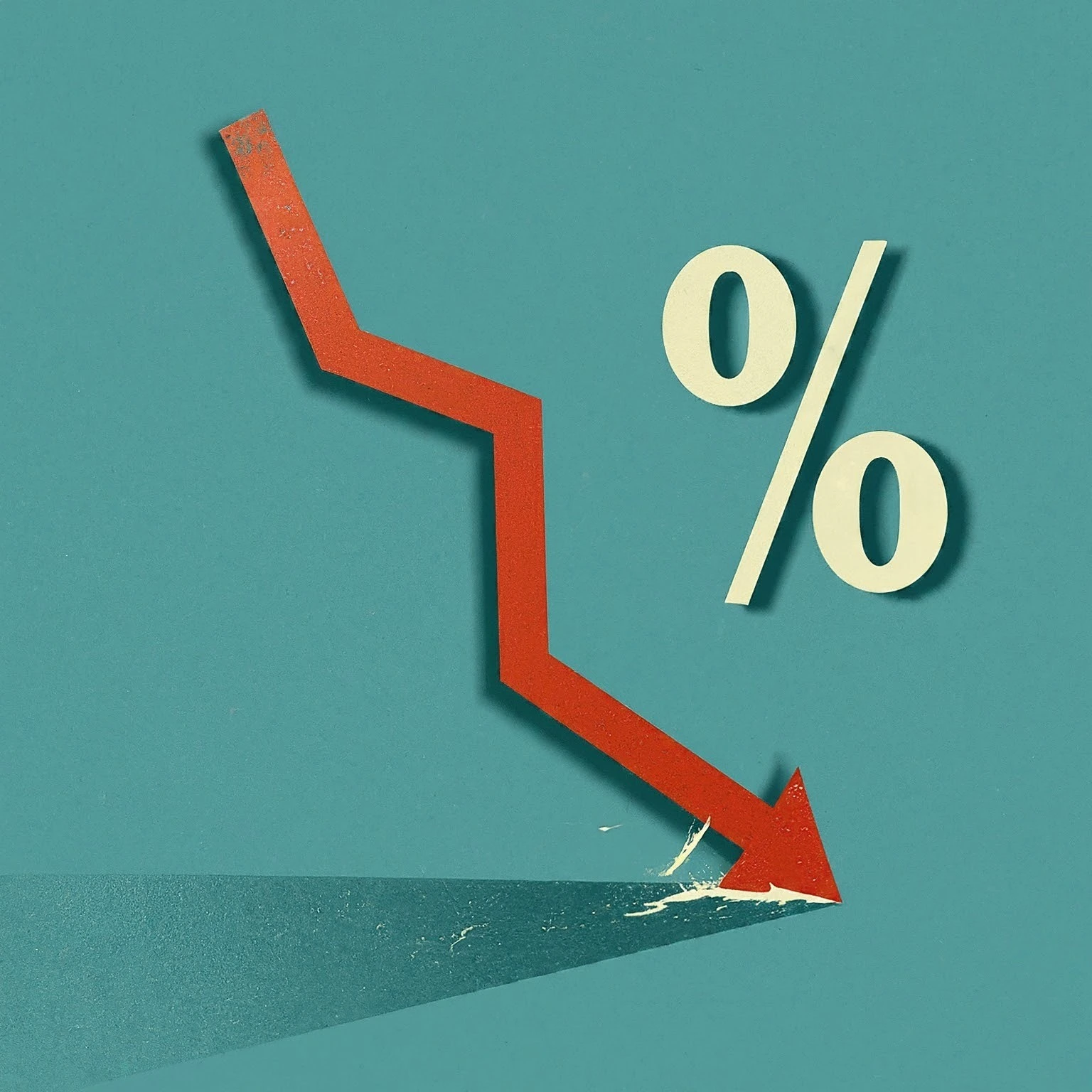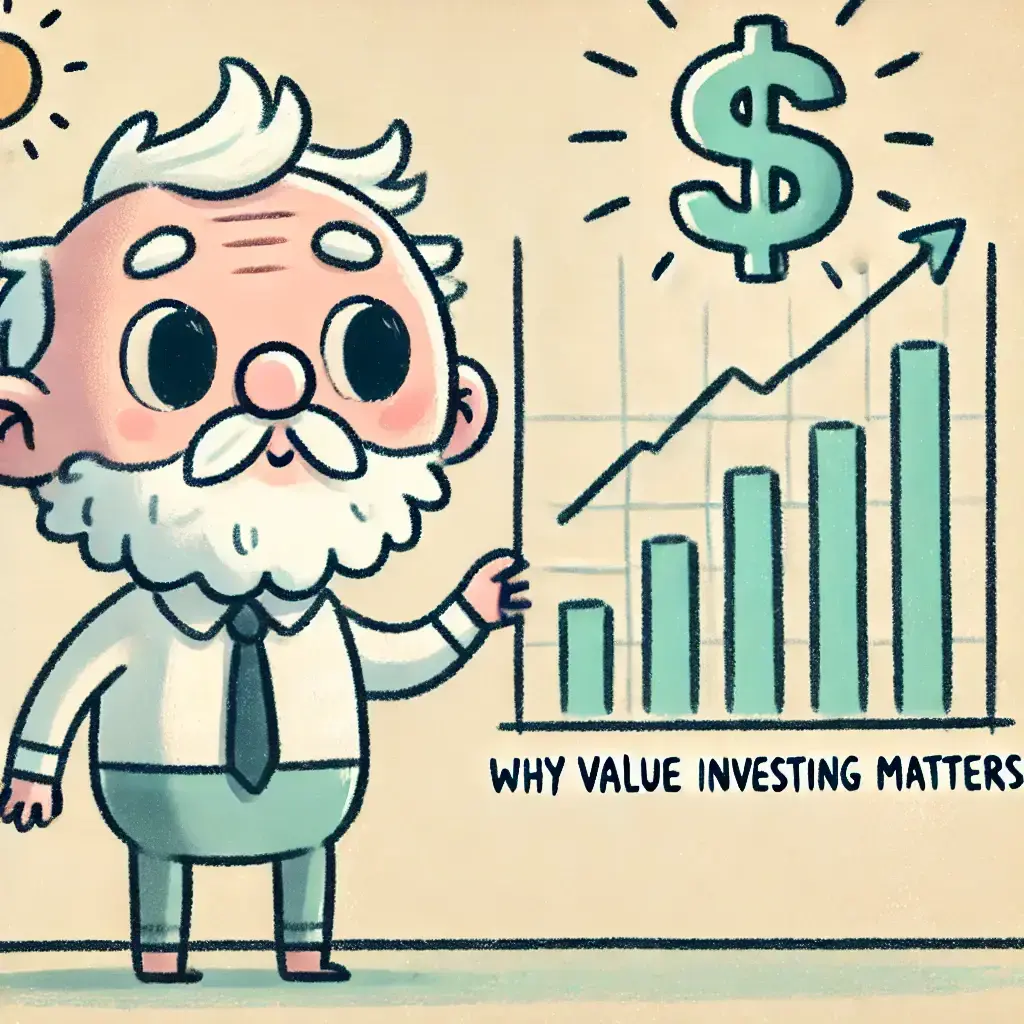
Value Investing
Value investing is an investment strategy that involves selecting stocks or other securities that appear to be undervalued by the market. Investors practicing value investing seek out companies whose stock prices are lower than their intrinsic value, often based on factors like earnings, dividends, or asset value. The strategy is rooted in the belief that the market occasionally misprices securities, providing opportunities to buy at a discount. Value investors typically focus on companies with strong fundamentals, stable earnings, and a low price-to-earnings (P/E) ratio. The goal is to purchase these undervalued assets and hold them until the market corrects its pricing, leading to potential capital appreciation.
Value Investing Guide




Value Investing Glossary
- Absolute Valuation(Noun)
- /ab-suh-loot val-yoo-ay-shuhn/
- Definition: A method of valuation that determines the intrinsic value of a company based on fundamentals such as dividends, cash flow, and growth rates, without comparing it to other companies.
- Etymology: "Absolute" from Latin "absolutus," meaning "complete or perfect," and "valuation" from Latin "valere," meaning "to be worth." Absolute valuation focuses on determining the true worth of a company.
- Similar: Intrinsic valuation, Fundamental valuation
- Opposite: Relative valuation
- Example: "Absolute valuation methods like discounted cash flow analysis are often used by value investors to find undervalued stocks."
- Asset Play(Noun)
- /as-et pley/
- Definition: An investment strategy that focuses on companies with valuable assets, such as real estate or patents, which are undervalued by the market, offering potential for significant gains when the market recognizes their true value.
- Etymology: "Asset" from Old French "asez," meaning "sufficient," and "play" from Old English "plegian," meaning "to move rapidly." An asset play capitalizes on hidden or undervalued assets.
- Similar: Value play, Asset-based investing
- Opposite: Earnings play
- Example: "Investors looking for an asset play might target companies with significant real estate holdings that are not fully reflected in the stock price."
- Balance Sheet Strength(Noun)
- /bal-uhns sheet strengkth/
- Definition: The overall financial health of a company as indicated by its balance sheet, including factors such as low debt levels, high liquidity, and strong asset quality, which are crucial for assessing a company's long-term viability.
- Etymology: "Balance" from Old French "balance," meaning "scales for weighing," "sheet" from Old English "sceat," meaning "a piece of cloth," and "strength" from Old English "strengðu," meaning "power." Balance sheet strength indicates financial robustness.
- Similar: Financial strength, Balance sheet health
- Opposite: Balance sheet weakness
- Example: "A company with strong balance sheet strength is better positioned to weather economic downturns and take advantage of growth opportunities."
- Benjamin Graham(Noun)
- /ben-juh-min grey-uhm/
- Definition: An influential economist and investor known as the "father of value investing," who advocated for a disciplined approach to investing based on intrinsic value, margin of safety, and rigorous financial analysis.
- Etymology: "Benjamin" from Hebrew "Binyamin," meaning "son of the right hand," and "Graham" from Old English "Grāham," meaning "gravelly homestead." Benjamin Graham's teachings form the foundation of value investing.
- Similar: Father of value investing, Graham
- Example: "Benjamin Graham's book, The Intelligent Investor, remains a seminal work for those practicing value investing."
- Capital Allocation(Noun)
- /kap-i-tl al-uh-key-shuhn/
- Definition: The process by which a company’s management decides how to invest the company’s capital, such as reinvesting in the business, paying down debt, or returning money to shareholders through dividends or buybacks, crucial for maximizing shareholder value.
- Etymology: "Capital" from Latin "capitalis," meaning "of the head," and "allocation" from Latin "allocare," meaning "to assign." Capital allocation involves strategically distributing financial resources.
- Similar: Capital distribution, Resource allocation
- Opposite: Capital misallocation
- Example: "Effective capital allocation is key to enhancing a company's return on invested capital and long-term growth."
- Cash Rich(Adjective)
- /kash rich/
- Definition: A company that holds a significant amount of cash or liquid assets relative to its liabilities, providing financial flexibility and the ability to invest, pay dividends, or buy back shares without needing external financing.
- Etymology: "Cash" from Old French "casse," meaning "money box," and "rich" from Old English "rice," meaning "powerful." A cash-rich company has substantial liquid assets available.
- Similar: Liquid, Financially strong
- Opposite: Cash-poor
- Example: "Cash-rich companies are often more resilient during economic downturns and have the ability to capitalize on acquisition opportunities."
- Catalyst(Noun)
- /kat-l-ist/
- Definition: An event or factor that drives a significant change in the value of an investment, such as a corporate restructuring, new product launch, or regulatory approval, often triggering a reassessment of the company’s valuation.
- Etymology: "Catalyst" from Greek "katalysis," meaning "dissolution." In investing, a catalyst can be any event that significantly impacts a stock's price.
- Similar: Trigger, Market mover
- Opposite: Stagnation
- Example: "The announcement of a major acquisition served as a catalyst for the stock's sharp rise."
- Contrarian Bet(Noun)
- /kuhn-trair-ee-uhn bet/
- Definition: An investment strategy that involves going against prevailing market trends, typically by buying undervalued assets when most investors are selling and selling overvalued assets when most are buying, based on the belief that the majority is often wrong.
- Etymology: "Contrarian" from Latin "contrarius," meaning "opposite," and "bet" from Old English "beot," meaning "a pledge." A contrarian bet is an investment decision that opposes the general market sentiment.
- Similar: Opposite play, Counter-market strategy
- Opposite: Consensus trade
- Example: "His contrarian bet on the housing market paid off when prices rebounded sharply after the downturn."
- Cyclical Stocks(Noun)
- /sik-li-kuhl stoks/
- Definition: Stocks of companies whose business performance and stock prices are highly correlated with the economic cycle, typically rising during economic expansions and falling during recessions, such as those in the automotive or construction sectors.
- Etymology: "Cyclical" from Greek "kyklos," meaning "circle," and "stocks" from Old English "stocc," meaning "a tree trunk." Cyclical stocks move in line with economic cycles.
- Similar: Economic-sensitive stocks, Sectoral stocks
- Opposite: Defensive stocks
- Example: "Investors often buy cyclical stocks during the early stages of economic recovery to benefit from the expected growth."
- Debt Coverage Ratio(Noun)
- /det kuhv-er-ij rey-shee-oh/
- Definition: A financial ratio that measures a company’s ability to service its debt, typically by comparing its earnings before interest, taxes, depreciation, and amortization (EBITDA) to its debt obligations, indicating financial stability and creditworthiness.
- Etymology: "Debt" from Old English "dette," meaning "something owed," "coverage" from Old French "covrir," meaning "to cover," and "ratio" from Latin "ratio," meaning "calculation." Debt coverage ratio assesses a company's ability to meet its debt payments.
- Similar: Debt service ratio, Interest coverage ratio
- Example: "A high debt coverage ratio indicates that the company can comfortably cover its debt payments with its earnings."
- Deep Value(Noun)
- /deep val-yoo/
- Definition: An investment strategy that focuses on buying stocks that are significantly undervalued relative to their intrinsic value, often involving companies that are out of favor, distressed, or trading at very low price-to-book ratios.
- Etymology: "Deep" from Old English "deop," meaning "profound," and "value" from Latin "valere," meaning "to be worth." Deep value investing seeks to identify stocks with substantial potential for price appreciation.
- Similar: Undervalued investing, Distressed investing
- Opposite: Growth investing
- Example: "Deep value investors look for companies trading at significant discounts to their intrinsic worth, often in industries facing temporary setbacks."
- Defensive Stocks(Noun)
- /dih-fen-siv stoks/
- Definition: Stocks of companies that provide essential goods or services, such as utilities, healthcare, and consumer staples, which tend to have stable earnings and dividends and are less affected by economic downturns.
- Etymology: "Defensive" from Latin "defensivus," meaning "serving to defend," and "stocks" from Old English "stocc," meaning "a tree trunk." Defensive stocks are considered safe investments during economic uncertainty.
- Similar: Safe stocks, Non-cyclical stocks
- Opposite: Cyclical stocks
- Example: "Defensive stocks are often included in portfolios to provide stability during volatile market conditions."
- Discount Rate(Noun)
- /dis-kount reyt/
- Definition: The interest rate used to discount future cash flows to their present value, reflecting the time value of money and risk, commonly used in valuation models such as the discounted cash flow (DCF) analysis.
- Etymology: "Discount" from Latin "discomputare," meaning "to count down," and "rate" from Old French "rate," meaning "estimated value." The discount rate adjusts future cash flows to present value terms.
- Similar: Interest rate, Cost of capital
- Opposite: Growth rate
- Example: "The discount rate is a critical factor in determining the present value of an investment's future cash flows."
- Discount to Book(Noun)
- /dis-kount too book/
- Definition: A valuation metric that indicates how much a stock is trading below its book value per share, suggesting that the market is undervaluing the company's net assets, often a key consideration in value investing.
- Etymology: "Discount" from Latin "discomputare," meaning "to count down," and "book" from Old English "boc," meaning "written document." Discount to book measures how much below book value a stock is trading.
- Similar: Price-to-book discount, Book value discount
- Opposite: Premium to book
- Example: "A significant discount to book value might indicate that the stock is undervalued by the market."
- Dividend Coverage Ratio(Noun)
- /div-i-dend kuhv-er-ij rey-shee-oh/
- Definition: A financial metric that measures a company’s ability to pay dividends from its net income, calculated by dividing net income by the total dividends paid, indicating the sustainability of dividend payments.
- Etymology: "Dividend" from Latin "dividendum," meaning "a thing to be divided," "coverage" from Old French "covrir," meaning "to cover," and "ratio" from Latin "ratio," meaning "calculation." Dividend coverage ratio assesses the ability to maintain dividend payments.
- Similar: Payout coverage, Dividend sustainability ratio
- Opposite: Dividend payout ratio (in some contexts)
- Example: "A high dividend coverage ratio suggests that the company can comfortably afford its dividend payments."
- Earnings Power(Noun)
- /ur-ningz pou-er/
- Definition: The sustainable earning capacity of a company, reflecting its ability to generate profits over time, often used in valuation to determine the true economic value of the business.
- Etymology: "Earnings" from Old English "earnian," meaning "to earn," and "power" from Latin "potentia," meaning "ability." Earnings power represents the long-term profitability potential of a company.
- Similar: Profit potential, Sustainable earnings
- Opposite: Earnings volatility
- Example: "Investors focus on a company's earnings power to assess its ability to generate consistent profits in the future."
- Economic Value Added (EVA)(Noun)
- /ek-uh-nom-ik val-yoo ad-id/
- Definition: A measure of a company’s financial performance that shows the net profit after deducting the cost of capital, indicating whether a company is generating value over and above the required return for its investors.
- Etymology: "Economic" from Greek "oikonomikos," meaning "household management," "value" from Latin "valere," meaning "to be worth," and "added" from Latin "addere," meaning "to put to." EVA quantifies the value created beyond the cost of capital.
- Similar: Residual income, Economic profit
- Opposite: Economic loss
- Example: "A positive Economic Value Added (EVA) indicates that the company is generating returns above its cost of capital, creating value for shareholders."
- Equity Risk Premium(Noun)
- /ek-wi-tee risk pree-mee-uhm/
- Definition: The excess return that investing in the stock market provides over a risk-free rate, such as Treasury bonds, representing the compensation investors require for taking on higher risk.
- Etymology: "Equity" from Old French "equite," meaning "fairness," "risk" from Old Italian "risco," meaning "danger," and "premium" from Latin "praemium," meaning "reward." Equity risk premium is the additional return expected from equity investments.
- Similar: Market risk premium, Stock premium
- Opposite: Risk-free rate
- Example: "The equity risk premium is a key factor in determining the expected return on stocks versus safer investments like bonds."
- Equity Value(Noun)
- /ek-wi-tee val-yoo/
- Definition: The total value of a company’s outstanding shares of stock, calculated by multiplying the current stock price by the total number of shares, representing the market's valuation of the company’s equity.
- Etymology: "Equity" from Old French "equite," meaning "fairness," and "value" from Latin "valere," meaning "to be worth." Equity value reflects the market's perception of the worth of a company's equity.
- Similar: Market capitalization, Shareholder value
- Opposite: Enterprise value (in some contexts)
- Example: "Equity value is an important metric for investors assessing a company's market worth."
- Financial Health(Noun)
- /fi-nan-shuhl helth/
- Definition: The overall condition of a company’s finances, including its ability to generate profits, manage debt, and maintain sufficient liquidity, crucial for assessing long-term viability and investment risk.
- Etymology: "Financial" from Old French "finer," meaning "to pay," and "health" from Old English "haelth," meaning "wholeness." Financial health indicates the stability and strength of a company's finances.
- Similar: Fiscal health, Financial stability
- Opposite: Financial distress
- Example: "Investors examine a company’s financial health to determine its ability to survive economic downturns and grow sustainably."
- Financial Ratios(Noun)
- /fi-nan-shuhl rey-shee-ohz/
- Definition: Quantitative metrics used to evaluate a company’s financial performance, including profitability, liquidity, leverage, and efficiency, often used in financial analysis to compare companies and assess investment potential.
- Etymology: "Financial" from Old French "finer," meaning "to pay," and "ratios" from Latin "ratio," meaning "calculation." Financial ratios provide insights into a company's operational and financial efficiency.
- Similar: Financial metrics, Financial indicators
- Example: "Analysts use financial ratios like the price-to-earnings ratio and debt-to-equity ratio to assess a company's performance relative to its peers."
- Financial Statement Analysis(Noun)
- /fi-nan-shuhl steyt-muhnt uh-nal-uh-sis/
- Definition: The process of reviewing and analyzing a company’s financial statements to assess its financial performance, including profitability, liquidity, and solvency, used to make informed investment decisions.
- Etymology: "Financial" from Old French "finer," meaning "to pay," "statement" from Latin "stare," meaning "to stand," and "analysis" from Greek "analusis," meaning "a breaking up." Financial statement analysis evaluates a company's financial condition.
- Similar: Financial review, Financial analysis
- Opposite: Superficial analysis
- Example: "Financial statement analysis helps investors determine the financial health and future prospects of a company."
- Free Cash Flow Yield(Noun)
- /free kash floh yeeld/
- Definition: A valuation metric that measures the amount of free cash flow a company generates relative to its market capitalization, providing insights into its ability to generate cash and return value to shareholders.
- Etymology: "Free" from Old English "freo," meaning "not in bondage," "cash" from Old French "casse," meaning "money box," "flow" from Old English "flowan," meaning "to flow," and "yield" from Old English "gieldan," meaning "to pay." Free cash flow yield assesses a company's cash generation efficiency.
- Similar: Cash flow yield, FCF yield
- Opposite: Earnings yield
- Example: "A high free cash flow yield indicates that the company generates substantial cash relative to its market value, potentially making it an attractive investment."
- Graham Number(Noun)
- /gray-uhm nuhm-ber/
- Definition: A valuation metric developed by Benjamin Graham to determine the fair value of a stock, calculated as the square root of 22.5 times the book value per share times the earnings per share (EPS), providing a conservative estimate of intrinsic value.
- Etymology: Named after Benjamin Graham, the father of value investing. The "number" refers to the formula used to estimate the fair value of a stock.
- Similar: Intrinsic value formula, Graham valuation
- Example: "The Graham Number is often used by value investors to identify stocks that are undervalued based on conservative estimates."
- Hidden Assets(Noun)
- /hid-n as-ets/
- Definition: Assets that are undervalued or not fully recognized on a company’s balance sheet, such as real estate, intellectual property, or undervalued subsidiaries, which can present opportunities for value investors.
- Etymology: "Hidden" from Old English "hydan," meaning "to conceal," and "assets" from Latin "satis," meaning "enough." Hidden assets represent undervalued or unrecognized resources in a company.
- Similar: Undervalued assets, Unrecognized assets
- Opposite: Fully valued assets
- Example: "Investors who can identify hidden assets within a company may uncover significant value not reflected in the current stock price."
- Investment Thesis(Noun)
- /: in-vest-muhnt thee-sis/
- Definition: A detailed explanation of the reasons and rationale behind an investment decision, including analysis of the company’s fundamentals, industry position, and potential catalysts for value appreciation.
- Etymology: "Investment" from Latin "investire," meaning "to clothe," and "thesis" from Greek "thesis," meaning "a proposition." An investment thesis outlines the logic and expectations behind an investment.
- Similar: Investment rationale, Investment argument
- Example: "A strong investment thesis is essential for justifying why a particular stock is expected to perform well."
- Large Cap Value(Noun)
- /lahrj kap val-yoo/
- Definition: A category of stocks representing large, well-established companies that are considered undervalued based on fundamental analysis, often characterized by strong balance sheets and steady dividends.
- Etymology: "Large" from Latin "largus," meaning "abundant," "cap" from "capitalization," and "value" from Latin "valere," meaning "to be worth." Large cap value stocks are those of established companies trading below their intrinsic worth.
- Similar: Blue-chip value, Large-cap undervalued stocks
- Opposite: Large-cap growth
- Example: "Large cap value stocks are popular among conservative investors seeking stability and income."
- Liquidation(Noun)
- /lik-wuh-dey-shuhn/
- Definition: The process of dissolving a company by selling off its assets to pay creditors and distribute any remaining funds to shareholders, typically occurring when a company is bankrupt or ceasing operations.
- Etymology: "Liquidation" from Latin "liquidare," meaning "to melt, clarify," referring to the process of turning assets into cash.
- Similar: Dissolution, Wind-up
- Opposite: Continuation (in some contexts)
- Example: "During liquidation, the company’s assets are sold off to satisfy its debts, with any residual value distributed to shareholders."
- Liquidation Value(Noun)
- /lik-wuh-dey-shuhn val-yoo/
- Definition: The estimated amount that would be received if a company’s assets were sold off individually, typically in a distressed or forced sale, providing a baseline value for investors in worst-case scenarios.
- Etymology: "Liquidation" from Latin "liquidare," meaning "to melt, clarify," and "value" from Latin "valere," meaning "to be worth." Liquidation value assesses the minimum worth of a company's assets if sold.
- Similar: Forced sale value, Break-up value
- Opposite: Going concern value
- Example: "Investors may consider liquidation value to determine the potential downside risk if a company goes bankrupt."
- Low P/E Ratio(Noun)
- /loh pee-ee rey-shee-oh/
- Definition: A financial metric that indicates a company’s stock is trading at a low price relative to its earnings per share, suggesting it may be undervalued compared to its peers, often sought by value investors.
- Etymology: "Low" from Old English "lah," meaning "not high," "P/E" stands for "price-to-earnings," with "ratio" from Latin "ratio," meaning "calculation." A low P/E ratio can signal an undervalued stock.
- Similar: Low earnings multiple, Value P/E
- Opposite: High P/E ratio
- Example: "A low P/E ratio might indicate that the stock is undervalued, making it an attractive option for value investors."
- Low Price-to-Earnings(Noun)
- /loh prahys-too ur-ningz/
- Definition: A valuation metric indicating that a company’s stock price is low relative to its earnings per share, often suggesting the stock is undervalued or that the company is experiencing temporary difficulties.
- Etymology: "Low" from Old English "lah," meaning "not high," "price" from Latin "pretium," meaning "worth," and "earnings" from Old English "earnian," meaning "to earn." Low price-to-earnings often signals potential value.
- Similar: Low P/E, Undervalued earnings
- Opposite: High price-to-earnings
- Example: "Investors looking for undervalued stocks often target companies with a low price-to-earnings ratio."
- Market Anomaly(Noun)
- /mahr-kit uh-nom-uh-lee/
- Definition: A situation in the financial markets that deviates from the efficient market hypothesis, such as seasonal effects or price patterns, which can potentially be exploited for profit by investors.
- Etymology: "Market" from Latin "mercatus," meaning "trade," and "anomaly" from Greek "anomalos," meaning "uneven or irregular." Market anomalies are exceptions to expected market behavior.
- Similar: Market irregularity, Market inefficiency
- Opposite: Market efficiency
- Example: "The January effect is a well-known market anomaly where stock prices tend to rise in the first month of the year."
- Market Efficiency(Noun)
- /mahr-kit uh-fish-uhn-see/
- Definition: The degree to which stock prices reflect all available information, making it difficult for investors to consistently achieve higher returns than the overall market through stock picking or market timing.
- Etymology: "Market" from Latin "mercatus," meaning "trade," and "efficiency" from Latin "efficientia," meaning "effectiveness." Market efficiency suggests that markets accurately price securities based on available information.
- Similar: Efficient market, Information efficiency
- Opposite: Market inefficiency
- Example: "In a perfectly efficient market, it would be impossible to consistently outperform the market since all information is already reflected in stock prices."
- Net Net Stock(Noun)
- /net net stok/
- Definition: A type of value investment where a stock is purchased for less than the value of its net current assets (current assets minus total liabilities), providing a margin of safety, as popularized by Benjamin Graham.
- Etymology: "Net" from Old English "nett," meaning "clear of charges," and "stock" from Old English "stocc," meaning "a tree trunk." Net net stocks are deeply undervalued based on current asset value alone.
- Similar: Deep value stock, Graham stock
- Opposite: High-growth stock
- Example: "Net net stocks are rare finds but can offer significant returns if the market eventually recognizes their true value."
- P/E Compression(Noun)
- /P-E kom-PRESH-uhn/
- Definition: A situation where the Price-to-Earnings (P/E) ratio decreases, often due to a drop in stock prices or an increase in earnings, making stocks appear cheaper relative to their earnings.
- Etymology: Derived from the financial term "Price-to-Earnings ratio," with "compression" indicating a decrease. This term reflects a shift in market sentiment, where investors may perceive stocks as being less valuable, leading to a lower P/E ratio.
- Similar: P/E ratio decline
- Opposite: P/E Expansion
- Example: "During the market downturn, many tech stocks experienced significant P/E compression, presenting potential buying opportunities."
- P/E Expansion(Noun)
- /P-E ek-SPAN-shun/
- Definition: A situation where the Price-to-Earnings (P/E) ratio increases, usually due to rising stock prices or falling earnings, making stocks appear more expensive relative to their earnings.
- Etymology: Derived from the financial term "Price-to-Earnings ratio," with "expansion" indicating an increase. This term highlights a shift where investors are willing to pay more for a company's earnings, often due to expected future growth.
- Similar: P/E ratio increase
- Opposite: P/E Compression
- Example: "Investors' optimism about the company's future led to P/E expansion, driving the stock price higher."
- Patient Capital(Noun)
- /PAY-shuhnt KAP-i-tuhl/
- Definition: Investment funds that are committed for the long term, allowing time for the investment to mature and generate returns without pressure for quick profits.
- Etymology: The word "patient" comes from Latin "patientia," meaning "suffering" or "endurance." In financial terms, it refers to the willingness to wait for returns, reflecting an investment approach that favors long-term gains over short-term profits.
- Similar: Long-term capital
- Opposite: Short-term capital
- Example: "Venture capital firms often seek patient capital from investors who understand the long-term nature of startup investments."
- Price-to-Cash Flow Ratio (P/CF)(Noun)
- /PRAHYS tuh KASH floh REY-shoh/
- Definition: A valuation metric that compares a company’s market price to its cash flow, providing insight into how much investors are willing to pay for each dollar of cash flow generated by the company.
- Etymology: The term combines "Price," the market value of a company’s stock, with "Cash Flow," the net amount of cash generated. It indicates how market perceptions of a company’s cash-generating ability influence its stock price.
- Similar: Cash flow multiple
- Example: "A lower Price-to-Cash Flow Ratio (P/CF) suggests that the stock might be undervalued, especially compared to its peers."
- Return on Invested Capital (ROIC)(Noun)
- /ri-TURN on in-VEST-ed KAP-i-tuhl/
- Definition: A financial performance metric that measures the efficiency of a company in generating profits from the capital invested by shareholders and debt holders.
- Etymology: "Return" reflects the gain or profit, "Invested Capital" refers to the funds used for growth or operations. This term signifies how well a company utilizes its capital to produce returns.
- Similar: Return on capital
- Example: "A high Return on Invested Capital (ROIC) indicates that the company is effectively using its capital to generate profits."
- Reversion to Mean(Noun)
- /ri-VUR-zhun tuh meen/
- Definition: The financial theory that asset prices and returns eventually move back towards their historical average or mean over time.
- Etymology: "Reversion" comes from Latin "revertere," meaning "to return," and "mean" refers to the average. This term suggests that extreme asset prices or returns are temporary and will revert to normal levels.
- Similar: Mean reversion
- Example: "Investors betting on reversion to mean often buy undervalued stocks expecting their prices to normalize over time."
- Safety Margin(Noun)
- /SEYF-tee MAHR-jin/
- Definition: The difference between the intrinsic value of a stock and its market price, providing a cushion against errors in analysis or market volatility.
- Etymology: "Safety" implies protection, and "margin" comes from Latin "margo," meaning "edge" or "border." In finance, it refers to the buffer zone ensuring investment security.
- Similar: Margin of safety
- Opposite: Risk exposure
- Example: "Value investors seek a safety margin to protect against unforeseen risks when buying stocks."
- Small Cap Value(Noun)
- /smawl kap VAL-yoo/
- Definition: Refers to small-cap companies that are considered undervalued based on metrics like P/E ratio, P/B ratio, or dividend yield. These stocks have the potential for significant growth.
- Etymology: "Small cap" refers to a company's small market capitalization, and "value" indicates a stock perceived to be undervalued. This term represents an investment strategy focusing on small companies with growth potential at a discount.
- Similar: Small-cap undervalued stocks
- Opposite: Large-cap growth
- Example: "Investors looking for growth opportunities often include small cap value stocks in their portfolios."
- Special Situation(Noun)
- /SPESH-uhl si-choo-AY-shun/
- Definition: Investment opportunities that arise from unique circumstances, such as mergers, bankruptcies, or spin-offs, which may present short-term gains or undervalued opportunities.
- Etymology: "Special" indicates something unique, and "situation" comes from Latin "situatio," meaning "the way in which something is placed." In finance, it refers to unusual market events creating specific investment opportunities.
- Similar: Event-driven investment
- Opposite: Regular investment
- Example: "The company's restructuring created a special situation that attracted the interest of savvy investors."
- Stock Repurchase(Noun)
- /stok ree-PUR-chus/
- Definition: A corporate action where a company buys back its own shares from the marketplace, reducing the number of outstanding shares and often increasing the value of remaining shares.
- Etymology: "Stock" refers to the equity or shares of a company, and "repurchase" comes from Latin "re-" meaning "again" and "purchase" meaning "to buy." This term describes the process of a company re-acquiring its own stock.
- Similar: Share buyback
- Opposite: Share issuance
- Example: "The company announced a stock repurchase program, signaling confidence in its future prospects."
- Stock Screener(Noun)
- /stok SKREE-nur/
- Definition: A tool or software used by investors to filter and identify stocks that meet specific financial criteria, such as P/E ratio, dividend yield, or market cap.
- Etymology: "Stock" refers to company shares, and "screener" comes from "screen," meaning "to filter." This term describes a process that helps investors sift through numerous stocks to find potential investments.
- Similar: Stock filter
- Example: "Using a stock screener, she narrowed down her choices to a few promising tech companies."
- Sum-of-the-Parts Valuation(Noun)
- /suhm-uhv-thuh-pahrts val-yoo-AY-shun/
- Definition: A method of valuing a company by determining the value of each of its business segments separately and then adding them together to get the total value.
- Etymology: "Sum" comes from Latin "summa," meaning "total," and "parts" refers to individual segments. This term emphasizes breaking down a company into its components to assess its overall value.
- Similar: Breakup valuation
- Example: "The analyst used a sum-of-the-parts valuation to determine the company's worth, considering each division separately."
- Tangible Assets(Noun)
- /TAN-juh-buhl AS-ets/
- Definition: Physical assets that can be touched or seen, such as machinery, buildings, or inventory, used by a company to produce goods or services.
- Etymology: "Tangible" comes from Latin "tangere," meaning "to touch," and "assets" from Latin "ad satis," meaning "enough." This term refers to physical resources with measurable value.
- Similar: Physical assets
- Opposite: Intangible assets
- Example: "The company's tangible assets, including factories and equipment, accounted for a significant portion of its total value."
- Turnaround Stocks(Noun)
- /TUR-nuh-rownd stoks/
- Definition: Stocks of companies that are undergoing significant positive changes, such as restructuring or management changes, which may lead to improved financial performance.
- Etymology: "Turnaround" suggests a reversal of fortunes, while "stocks" refers to shares in a company. This term describes companies in recovery stages that could offer substantial returns if successful.
- Similar: Recovery stocks
- Opposite: Declining stocks
- Example: "Investors looking for high-risk, high-reward opportunities often focus on turnaround stocks."
- Underpriced Stock(Noun)
- /uhn-der-PRAHYST stok/
- Definition: A stock that is believed to be trading below its intrinsic or fair value, often seen as a buying opportunity by value investors.
- Etymology: "Under" implies below, and "priced" refers to the stock's market value. This term describes a situation where a stock's market price is considered less than its true worth.
- Similar: Discounted stock
- Opposite: Overpriced stock
- Example: "The market correction left several underpriced stocks that savvy investors quickly scooped up."
- Undervalued(Adjective)
- /uhn-der-VAL-yood/
- Definition: A stock or asset that is trading for less than its intrinsic value, offering potential for significant appreciation as the market corrects its price.
- Etymology: "Under" suggests below, and "valued" pertains to worth or price. In financial contexts, it reflects the belief that the current market price is lower than the actual worth.
- Similar: Underpriced, discounted
- Opposite: Overvalued
- Example: "He focused on finding undervalued stocks with strong fundamentals for his long-term portfolio."
- Undervalued Stock(Noun)
- /uhn-der-VAL-yood stok/
- Definition: A stock that is considered to be priced below its true intrinsic value, often targeted by value investors who believe the market will eventually correct its price.
- Etymology: "Under" denotes below, and "valued" pertains to worth. This term reflects the belief that a stock's market price does not reflect its actual value.
- Similar: Underpriced stock
- Opposite: Overvalued stock
- Example: "Warren Buffett is known for his strategy of investing in undervalued stocks with strong long-term potential."
- Value ETF(Noun)
- /VAL-yoo E-T-F/
- Definition: An exchange-traded fund (ETF) that focuses on investing in stocks considered to be undervalued, typically those with low price-to-earnings or price-to-book ratios.
- Etymology: "Value" indicates a focus on undervalued assets, and "ETF" stands for Exchange-Traded Fund, a type of investment fund traded on stock exchanges. This term describes a fund that tracks value stocks.
- Similar: Value-focused ETF
- Opposite: Growth ETF
- Example: "Investors seeking to capitalize on undervalued stocks often invest in a value ETF for diversified exposure."
- Value Fund(Noun)
- /VAL-yoo fuhnd/
- Definition: A mutual fund or ETF that primarily invests in value stocks, which are considered to be undervalued compared to their intrinsic worth.
- Etymology: "Value" emphasizes the focus on undervalued assets, and "fund" comes from Old English "fand," meaning "to provide." This term represents a collective investment in stocks considered undervalued.
- Similar: Value-focused fund
- Opposite: Growth fund
- Example: "The value fund outperformed during the market downturn as investors flocked to undervalued stocks."
- Value Index(Noun)
- /VAL-yoo IN-deks/
- Definition: An index that tracks the performance of value stocks, typically those with low price-to-earnings or price-to-book ratios, offering a benchmark for value investing strategies.
- Etymology: "Value" refers to the emphasis on undervalued stocks, and "index" from Latin "indicare," meaning "to indicate," signifies a measure of performance. This term describes a market index focused on value-oriented stocks.
- Similar: Value stock index
- Opposite: Growth index
- Example: "The value index outperformed the broader market, reflecting the resurgence of undervalued stocks."
- Value Premium(Noun)
- /VAL-yoo PREE-mee-uhm/
- Definition: The additional return that value stocks are expected to provide over growth stocks, based on the assumption that they are undervalued and thus have more room to appreciate.
- Etymology: "Value" refers to the focus on undervalued assets, and "premium" comes from Latin "praemium," meaning "reward." In finance, it represents the extra return expected from value stocks.
- Similar: Value advantage
- Opposite: Growth premium
- Example: "Historically, the value premium has rewarded investors for holding undervalued stocks during market cycles."
- Value Screening(Noun)
- /VAL-yoo SKREE-nuhng/
- Definition: The process of identifying undervalued stocks using specific criteria, such as low P/E ratios or high dividend yields, to find potential investment opportunities.
- Etymology: "Value" reflects the focus on undervalued assets, and "screening" from Old English "scren," meaning "cover," refers to filtering or selecting stocks based on set criteria.
- Similar: Value filtering
- Opposite: Growth screening
- Example: "Value screening tools helped the investor identify several promising stocks trading below their intrinsic value."
- Value Trap(Noun)
- /VAL-yoo TRAP/
- Definition: A stock that appears undervalued but is actually priced low for valid reasons, such as deteriorating business fundamentals, which may not recover.
- Etymology: "Value" refers to the perception of being undervalued, and "trap" from Old English "treppe," meaning "snare," indicates a deceptive situation where the expected value does not materialize.
- Similar: False value
- Opposite: True value
- Example: "The investor avoided a value trap by thoroughly analyzing the company's long-term prospects before buying."
- Warren Buffett(Noun)
- /WAR-uhn BUF-it/
- Definition: A prominent American investor, business tycoon, and philanthropist known for his value investing strategy and long-term success in the stock market.
- Etymology: Named after Warren Buffett, whose investing principles and success have made his name synonymous with value investing and long-term financial wisdom.
- Similar: Oracle of Omaha
- Example: "Many investors look to Warren Buffett's investment philosophy for guidance on building long-term wealth."
Latest News

Best Sectors for Value Investing in 2024
Stock Market Fundamentals | over 1 year ago

Top Value Stocks for 2024: Undervalued Gems to Buy Now
Stock Market Fundamentals | over 1 year ago
Frequently Asked Questions
What is value investing?
Value investing is a strategy where investors buy stocks or other securities that are undervalued by the market. The idea is to purchase these assets at a discount and hold them until the market recognizes their true value, potentially leading to profit.
How do value investors determine if a stock is undervalued?
Value investors assess a stock's intrinsic value by examining factors like earnings, dividends, cash flow, and asset value. They compare this intrinsic value to the current market price to identify stocks that are trading below their true worth.
What are the key characteristics of a value stock?
A value stock typically has strong fundamentals, such as stable earnings, a solid balance sheet, and a low price-to-earnings (P/E) ratio. These stocks often belong to well-established companies that might be temporarily out of favor with the market.
What is intrinsic value?
Intrinsic value is the actual worth of a company based on its financial performance, assets, and earnings potential. It’s an estimate of what the stock should be worth, as opposed to its current market price.
What is a price-to-earnings (P/E) ratio, and why is it important in value investing?
The P/E ratio compares a company's current stock price to its earnings per share (EPS). A low P/E ratio might indicate that a stock is undervalued, making it attractive to value investors. It’s a key metric used to assess whether a stock is priced fairly relative to its earnings.
How does market mispricing occur?
Market mispricing happens when the market undervalues or overvalues a stock due to factors like investor sentiment, economic conditions, or short-term events. Value investors believe that these mispricings are temporary and that the market will eventually correct itself.
What is the difference between value investing and growth investing?
Value Investing: Focuses on buying undervalued stocks with the potential to increase in price as the market corrects itself. Growth Investing: Focuses on buying stocks of companies expected to grow rapidly, even if they are currently overvalued by traditional metrics.
What are the risks associated with value investing?
The main risks include the possibility that a stock remains undervalued for an extended period or that the market never corrects its pricing. Additionally, the company’s fundamentals may deteriorate, leading to losses rather than gains.
How long should a value investor hold a stock?
Value investing typically requires patience, as it may take time for the market to recognize and correct the undervaluation. Investors may hold a stock for several years, waiting for its price to align with its intrinsic value.
Can value investing be applied in any market condition?
Value investing can be applied in various market conditions, but it often thrives in markets where investor sentiment has led to mispricings. In a bullish market, value opportunities might be harder to find, whereas, in a bearish market, more stocks may become undervalued.
What role do dividends play in value investing?
Dividends are a key component for many value investors. Companies that pay regular dividends often have stable earnings and strong financial health, making them attractive to value investors looking for both income and potential capital appreciation.
Is value investing suitable for everyone?
Value investing requires patience, a long-term perspective, and the ability to tolerate periods of underperformance. It’s suitable for investors who are comfortable with a buy-and-hold approach and who are willing to do the necessary research to identify undervalued stocks.
Explore Value Investing








